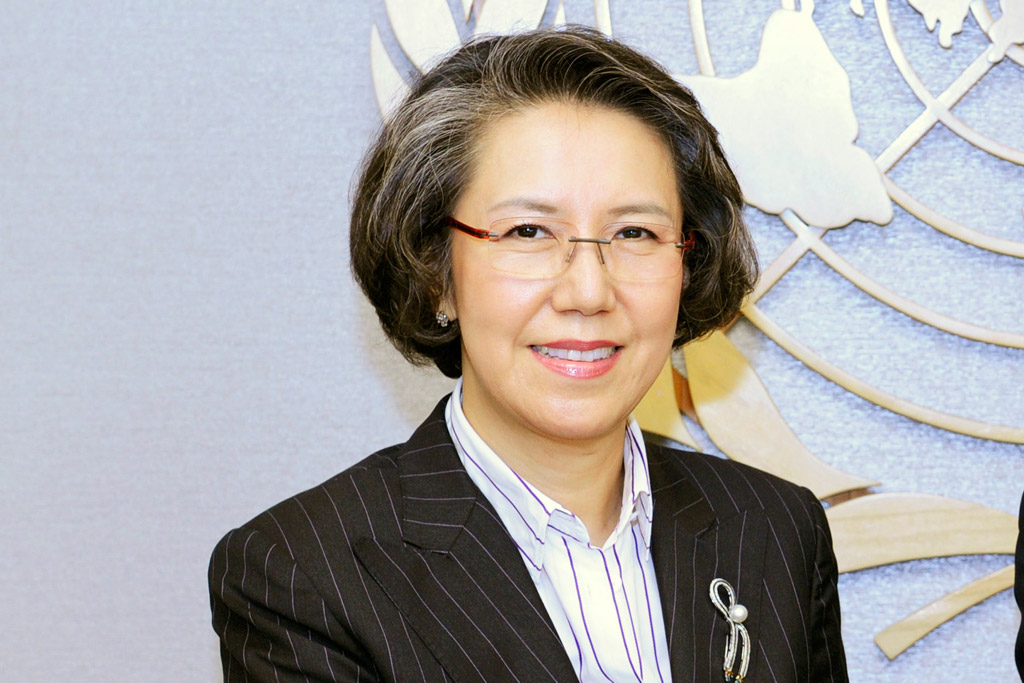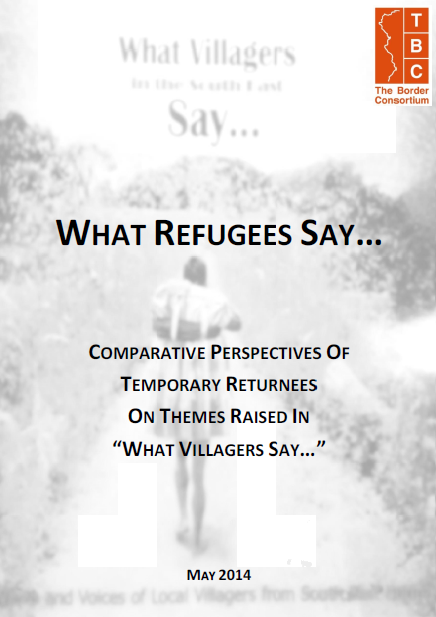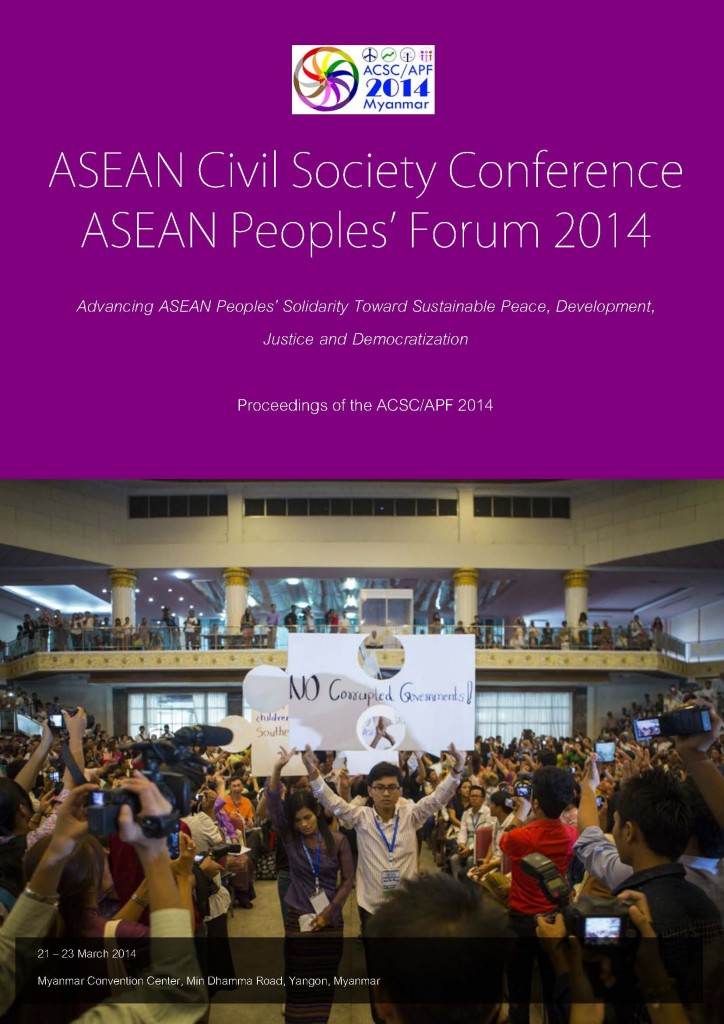Posts Tagged ‘Human Rights’ (685 found)
What Refugees Say…
Between March‐April this year, focus group discussions were held with temporary returnees to SE Burma/ Myanmar from all 9 refugee camps along the Thailand‐Burma/ Myanmar border. The aim was to gain a snapshot of individual perspectives and concerns on current conditions on the ground, rather than conducting a formal survey representational of the whole refugee caseload.
The consultations focused on the conditions in the areas they returned to, the changes they and residents in those areas had detected since recent political and military shifts in the country, and their perceived current barriers to return.
The participants were identified by Section Leaders, with criteria that they must have returned to SE Burma/ Myanmar since the ceasefires were brokered, be adults, and that there should be some gender equity amongst them. In total, 85 temporary returnees participated in the consultations, with 35% being female. Over 100 others, comprising senior community leaders and CBO staff were also engaged through the process, although the main findings in this report only reflect the perspectives of those who had recently returned to their country of origin […]
• • •Case Against Labour Rights Defender Draws International Outcry – Nearly 100 International Rights Groups Demand Industry Action
Today (8 August), nearly 100 international and national labor and human rights groups and NGOs sent a joint-letter to members of the Thai Pineapple Industry Association (TPIA), calling on them to to urge TPIA member Natural Fruit to drop the criminal and civil charges it leveled against researcher and labor rights activist Andy Hall. Signatories to the letter include representatives of more than 20 countries, as well as global organizations including the International Trade Union Confederation, European Coalition for Corporate Justice (ECCJ) and Human Rights Watch […]
• • •ASEAN Civil Society 2015 – ACSC/APF National Organizing Committee (NOC), Accelerating a People-Centered Region: Introspection of the Envisioned ASEAN Community in 2015
Kuala Lumpur – As Malaysia will be chairing the Association of Southeast Asian Nations (ASEAN) in 2015, the next ASEAN Civil Society Conference/ASEAN Peoples Forum (ACSC/APF)i Kuala Lumpur in March/April 2015, parallel to the ASEAN Summit. We are proud to say that it was the Malaysian government, under Tun Abdullah Ahmad Badawi as Prime Minister, which initiated the first ASEAN civil society conference in 2005. Thus, the ACSC/APF 2015 marks a full circle since the meaningful initiative by Malaysia 10 years ago […]
• • •Burma/US: Kerry Should Press Rights Concerns
(New York) – US Secretary of State John Kerry should press the Burmese government during his upcoming visit to reverse Burma’s deteriorating rights situation, Human Rights Watch said today. Kerry is scheduled to visit Burma from August 8 to 10, 2014, to attend meetings of the Association of Southeast Asian Nations (ASEAN) and the ASEAN Regional Forum (ARF) […]
• • •Open Letter to the 47th ASEAN Foreign Ministers Meeting on the Review of the Terms of Reference of the ASEAN Intergovernmental Commission on Human Rights
Excellencies,
At the outset, pursuant to article 9.6 of the Terms of Reference (ToR) of the ASEAN Intergovernmental Commission on Human Rights (AICHR), the ToR shall be reviewed five years after its entry into force.
We, the undersigned civil society organizations across ASEAN region and beyond, recognise the role of the ASEAN Foreign Ministers Meeting (AMM) in shaping the future of the AICHR in the course of the review of its ToR […]
• • •Myanmar: Release Rohingya Political Prisoner Kyaw Hla Aung
(BANGKOK) The government of Myanmar should immediately and unconditionally release Rohingya human rights defender Kyaw Hla Aung, who has been arbitrarily detained for 13 months, Fortify Rights said today.
A ruling yesterday by the Sittwe District Court in Myanmar’s Rakhine State again extended the detention of Kyaw Hla Aung, 74, despite that the prosecution has repeatedly failed to produce witnesses in his case. The Sittwe District Court denied him bail and set the next court date at August 18, 2014 […]
• • •President Thein Sein Should Reveal Role in 88 Massacre
As the 26th anniversary of the 88 massacre and crackdown approaches, Burma Campaign UK today launches a campaign calling on President Thein Sein to publish his full army record and reveal his role during this time.
When he became President, Thein Sein described the massacre and crackdown as having ‘saved the nation’ […]
• • •ACSC/APF 2014 Post Conference Report
As a member of the Association of Southeast Asian Nations (ASEAN), Myanmar accepted the gavel that symbolizes the ASEAN presidency. This was a historic moment since this is the first time Myanmar has taken the Chair since it became a member of ASEAN. As Chair, Myanmar is responsible for hosting many important regional forums and events during 2014.
The ASEAN Civil Society Conference (ACSC), also known as the ASEAN Peoples’ Forum (APF), is held independently by the ASEAN Chair country in advance of, and parallel to, the official ASEAN Summit, which is attended by ASEAN and regional leaders. The first ACSC/APF took place in Malaysia in 2005. Since then it has taken place in the Philippines (2006), Singapore (2007), Thailand (2009), Vietnam (2010), Indonesia (2011), Cambodia (2012), Brunei (2013) and this year in Myanmar (2014). The 10th ACSC/APF took place on 21 – 23 March 2014 at the Myanmar Convention Center in Yangon, Myanmar.
• • •Press Release: World Bank Moves to Undermine the Rights of Indigenous Peoples
In an unprecedented move, the World Bank will be proposing that governments could ‘opt-out’ of requirements designed to protect indigenous peoples from unintended and negative consequences from development activities funded by the multilateral lender. In a leaked draft of new environmental and social standards to be considered for public consultation by a committee of the World Bank Executive Board on 30th of July, language has been included that would allow governments to disregard their existing obligations to indigenous peoples […]
• • •New Special Rapporteur, Familiar Human Rights Abuses
 The new Special Rapporteur on the situation of human rights in Burma, Ms. Yang Hee Lee, concluded her first visit to the country on 27 November, and unsurprisingly, found the human rights situation troubling, warning of the potential of backtracking on initial reforms, an analysis that resonates with many Burma followers. She outlined her initial findings at Rangoon airport in a statement just as she finished her mission, highlighting the shrinking of democratic space, the ongoing religious violence and discrimination, the deteriorating humanitarian conditions for internally displaced persons (IDPs) – especially Muslims – in Arakan State, the severe human rights abuses in Kachin State, the urgent necessity for legislative reform and the rule of law, the lack of involvement of women in both the peace process and governance, the exclusion of local people in large scale development projects and the impact of such projects on vulnerable communities, and the continuing incarceration of political activists, among other issues.
The new Special Rapporteur on the situation of human rights in Burma, Ms. Yang Hee Lee, concluded her first visit to the country on 27 November, and unsurprisingly, found the human rights situation troubling, warning of the potential of backtracking on initial reforms, an analysis that resonates with many Burma followers. She outlined her initial findings at Rangoon airport in a statement just as she finished her mission, highlighting the shrinking of democratic space, the ongoing religious violence and discrimination, the deteriorating humanitarian conditions for internally displaced persons (IDPs) – especially Muslims – in Arakan State, the severe human rights abuses in Kachin State, the urgent necessity for legislative reform and the rule of law, the lack of involvement of women in both the peace process and governance, the exclusion of local people in large scale development projects and the impact of such projects on vulnerable communities, and the continuing incarceration of political activists, among other issues.
We welcome Ms. Lee’s open and honest discussion of the term “Rohingya” and her pledge to be guided by international human rights law as regards the use of this term. This was despite the insistence of government officials not to use the word “Rohingya” throughout her trip to Arakan State. On the basis of this principled stance, we are reassured that Ms. Lee will not flinch from using the term when appropriate in the future. After visiting two camps for IDPs, one for Arakan Buddhists and one for Rohingya Muslims, Ms. Lee was troubled by both the terrible conditions in the camps and the lack of humanitarian access that is resulting in people dying due to insufficient medical assistance. She also acknowledged that this situation is “undeniably worse” in the camp for Rohingya. While she did not explicitly state that this is a situation engineered and maintained by the authorities, it is obvious that the unequal treatment of Buddhist and Muslim IDPs is a deliberate policy by the government that further punishes the Rohingya simply due to their ethnicity.
• • •










 All posts
All posts